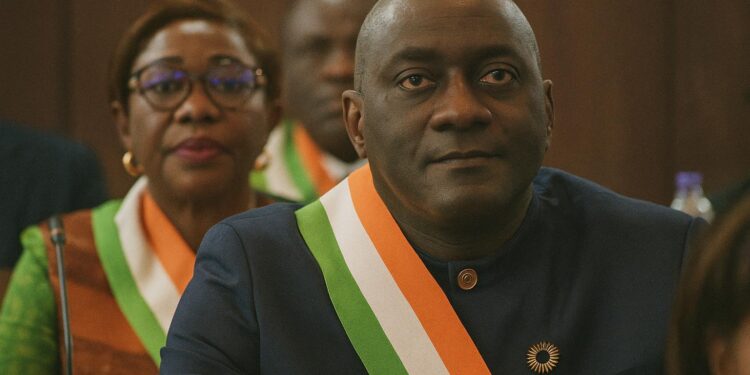Regional Legislatures Reset Priorities After Pandemic Disruptions
The mahogany benches of Côte d’Ivoire’s National Assembly filled to capacity this week, marking the inaugural ordinary session of the 2024 legislative calendar and the first to welcome a Congolese delegation since early 2019. The visit, confirmed by both chambers in Brazzaville and Abidjan (Congolese National Assembly communique), illustrates how Central-West African parliaments are recalibrating their diplomatic toolkits after three years dominated by sanitary emergencies. Rather than large-scale summits, elected officials now privilege targeted missions meant to translate continental blueprints such as the African Continental Free Trade Area into enforceable statutes. In that sense, the presence of Congo’s lawmakers served less as ceremonial courtesy and more as a working laboratory for legislative harmonisation.
A Delegation Crafted for Substance Over Symbolism
Led by First Vice-Speaker Léonidas-Jean Oba, the Congolese cohort combined committee chairs on finance, transport and defence, mirroring the triad most frequently cited in regional development indices. According to senior protocol officers, the selection was deliberate: each portfolio corresponds to a pending bill in either Brazzaville or Yamoussoukro. By embedding technical expertise in the protocol lists, both assemblies sought to shorten the usual lag between inter-parliamentary resolutions and domestic adoption. In closed-door briefings, Ivorian Speaker Adama Bictogo reportedly praised the ‘pragmatic spirit’ of his Congolese counterparts, noting that “our texts must speak the same language if our markets are to do so” (Ivorian Assembly press release, April 2024).
Trade Corridors and Security Tie the Two Banks of the Congo River to the Ébrié Lagoon
Economic dossiers dominated plenary side-meetings. Legislators debated the extension of the Pointe-Noire–Brazzaville rail modernisation toward the Abidjan–Ouagadougou corridor, an initiative backed by the African Development Bank. The conversation moved swiftly from infrastructure budgets to legislative oversight, with Congolese MPs sharing amendments that recently tightened public-private partnership clauses at home. Security questions proved equally prominent. Joint committees revisited maritime policing along the Gulf of Guinea, a region where illicit bunkering and piracy cost coastal states an estimated US $1.9 billion annually (Inter-Parliamentary Union data 2023). The two delegations agreed to synchronise reporting mechanisms so that naval commands can exchange actionable intelligence without procedural delays.
Multilateral Echoes From the Pan-African Parliament to COP 29
Beyond bilateral files, the session resonated with broader multilateral currents. Both Congo and Côte d’Ivoire will rotate into leadership roles at the Pan-African Parliament in May, and their lawmakers used the Abidjan rostrum to rehearse common positions on climate finance ahead of COP 29. Congo’s forest-rich territory, home to sizeable tracts of the Cuvette-Ouest peatlands, remains indispensable to continental carbon-credit schemes. Ivorian MPs, for their part, emphasised agronomic adaptation strategies for cocoa-growing zones vulnerable to erratic rainfall. By merging these thematic strengths, the two states aim to present a persuasive coalition for equitable climate funding, a stance that aligns neatly with Brazzaville’s aspiration to be recognised as a ‘solution country’ rather than a passive recipient.
Quiet Gains for Brazzaville’s Soft Power and Abidjan’s Legislative Efficiency
Diplomats stationed in both capitals describe the mission as an exercise in ‘low-visibility, high-yield’ engagement. For Brazzaville, the optics of constructive outreach reinforce President Denis Sassou Nguesso’s narrative of stability and responsible regionalism, a message that resonates with investors surveying Central Africa’s post-pandemic recovery. Abidjan, in turn, benefits from importing procedural know-how: Congo’s Assembly has piloted remote voting technologies whose deployment could accelerate Ivorian committee work during peak agricultural seasons. The upshot is a mutually beneficial feedback loop in which parliamentary cooperation buttresses executive-level accords without eclipsing sovereign prerogatives.
From Parliamentary Hallways to Policy Outcomes
As the ceremonial mace was lowered to adjourn the session, both delegations signed a memorandum committing to biannual reviews of legislative alignment. The document, largely procedural, nonetheless instils a rhythm that had been absent from Central-West African parliamentary calendars. Observers note that, while the agreement stops short of legally binding obligations, its emphasis on timelines and performance metrics reflects a maturing regional governance culture. Should the momentum hold, the Pointe-Noire rail extension and joint maritime protocols could serve as early tests, translating measured words exchanged in Yamoussoukro’s plenary hall into policies felt by dockworkers, freight forwarders and coastal communities alike.












































